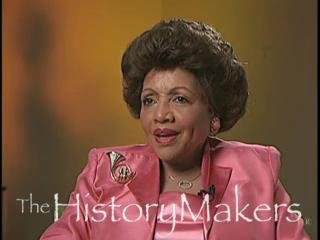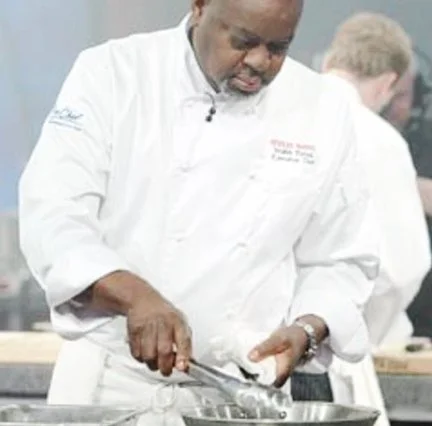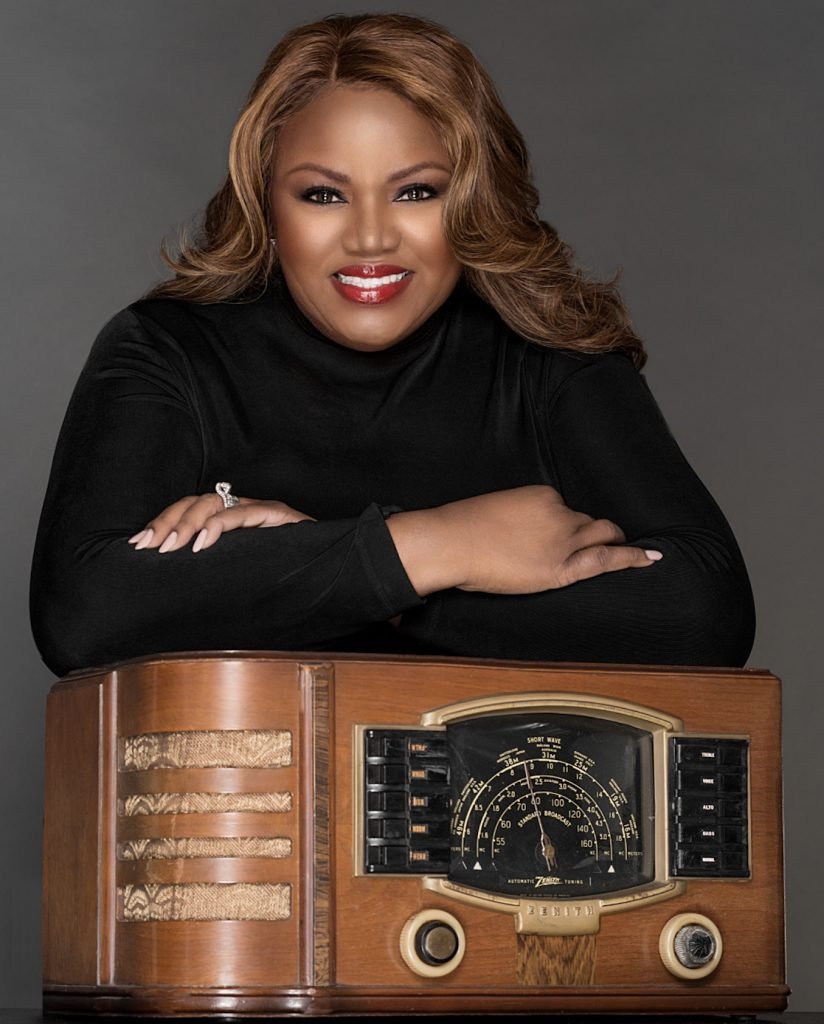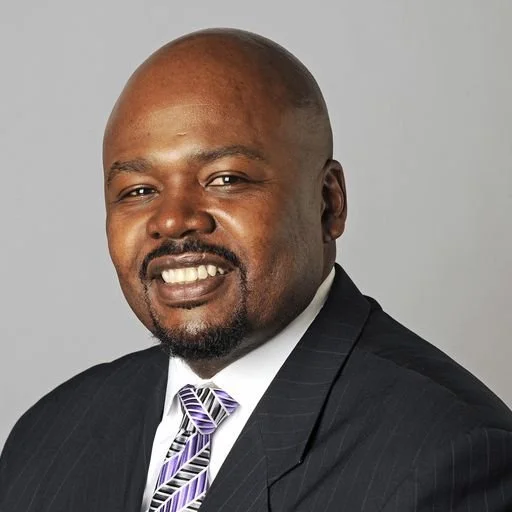Sweet or Savory: How Cornbread Healed a Nation
Cornbread is a staple dish in soul food. Whether you think cornbread should be flaky and savory, or solid and sweet, cornbread is an important part of the Black experience. Personally, I’ve never thought of cornbread as more than a piece of food on a plate, but with the digital archive, I was unable to unearth so much about Black history and just how impactful something as small as a piece of cornbread can be.
Mary “Betty” Brown (1932-) is a noted style maven from Chicago, who served as a wardrobe and makeup consultant to Miss Illinois in the Miss America pageant. Mary talks about her son Keith Brown, and how her love of cooking cornbread sparked a passion within him.
“Yeah, but the other thing is like this year during Martin Luther King [Reverend Dr. Martin Luther King, Jr.]--Black History Month is this month coming up and it was this month, too, we had a lot of activities in Elgin [Illinois]. We had the black--the Martin Luther King breakfast and we're going to a soul something at the library, and he at the courthouse decided he wanted to do something and he said he wanted to do a like a celebration. So he came to me and he said, "Well mom, what's your recipe for cornbread?" So I gave that to him. He said, "Well, that looks a little too hard." I said, "Well, you can make my pound cake." And so a pound of butter, a pound of powdered sugar and six eggs and flour and he made it. It was fabulous. So, he served all the judges in Geneva [Illinois] for lunch. He hired some ladies from Aurora [Illinois]. They come up and they brought greens and cornbread and black-eyed peas. He said, "They were eating greens, mom," and they ate his, his pound cake. They couldn't believe, but he's always cooking. He likes to cook because that's what I used to like to do.” [1]
Cooking has always been considered a form of therapy, especially in the Black community. Once I watched this video and saw the impact cooking had on Mary Betty’s family, I went into the archive and decided to explore the phrase cooking. Once I searched the term cooking, I decided to refine my findings to that of women, as I was curious about the relationship between womanhood and cooking and how those were formative experiences.
Beatrice McKissack (1930-), who served as the CEO of McKissack & McKissack architectural firm and civil rights activist, talked about how cooking helped her while her health was declining. Oftentimes, she found herself cooking when she was unable to teach, which was another passion of hers. However, she was also over her architecture agency, which required a large amount of her time during the week. However, I was greatly inspired that she was able to maintain her passions simultaneously. Oftentimes, we believe that we must choose between what we love to do and what we have to do. Seeing successful individuals having both is refreshing.
“Oh my mother raised us t- we could all do everything, was we had to do everything, my brothers, I never had to wash dishes, my brothers did, 'cause I liked to cook and so I was cooking at an early age. My mother really did not like to cook, she did it out of necessity, but I enjoyed it and my father [McKissack's stepfather, A.A. Taylor], I was making apple pies by the time I was thirteen, and I was making these pies and I would always have to make, they were so good, my father said, "Well one thing about it child, if you ever need a job, you could go into making apple pies." But I would always have to make one for him and then one for the family, so I was making two apple pies, three apple pies and in those days you know, he had to have dessert every evening so I loved to cook, I ended up doing the same thing for my husband [William McKissack], but it was always relaxing to me. And just like when I was running the company [McKissack and McKissack], I wasn't always able to do it on the, during the week, but on the weekends, I would always cook these big meals and prior to me running the company and I was a homemaker for fifteen years, after I was told I couldn't teach anymore because of my health, I had three major operations by the time I was thirty, by the time I was forty, I mean serious operations. And as a result of that, it helped me to get--I'll tell you the best time of my life when I was a homemaker, I enjoyed each and every day of it, like I used to tell my girls [Andrea McKissack, Deryl McKissack, and HistoryMaker Cheryl McKissack] every day is a holiday to me. [2]”
Once I saw this story, I was still looking to learn more about cornbread. So I went back and attempted to continue my search with that specific key word. However, I also wanted to see if there were chefs on the archive that could talk about how cooking helped either their mental, physical, or spiritual health. I searched and came across Walter Royal (1957-), a chef who won numerous culinary rewards and was among the nation’s top African American chefs. In his interview, he talks about how he was inspired by Edna Lewis to continue his culinary career.
“Oh, Edna has six publications, six cookbooks. Her first cookbook, 'The Edna Lewis Cookbook' [Edna Lewis], I've cooked everything in it more (laughter) than once. And she's this striking black--oh, was a striking older black woman that just--elegant! And I would read her books and read her recipes and go--whoa! And there was nobody else like her. There was no black southern chefs that I knew of at that time except Edna and God, God smiled on me when he gave me the opportunity to work with her and there was no way in the world I was turning it down. I had met Edna, then I met Jenny. I had two great women and Jenny Fitch, she was a wealthy Chapel Hill [North Carolina] woman. You know they owned Fitch Lumber Company [Chapel Hill, North Carolina], Fitch stockyard in Siler City [Carolina Stockyards Company, Siler City, North Carolina], just say and her passion, once again with all of her fortune was to bring something to Chapel Hill and she wanted an English inn and it is a true five, Michelin [Michelin Guide] five star destination.” [3]
After watching this interview, I realized that food was more than just a hobby, especially in the Black community. Food cultivated inspiration, and it gave people a sense of belongingness.
Felicia Middlebrooks (1967-) is the current co-anchor of WBBM’S Morning Drive in Chicago. In the interview series that she completed, she dedicated a video to her childhood and how even now she still thinks back to how her positive her childhood was and the formative experiences that took place.
Okay, wow. I remember--And I get real sentimental about this. 'Cause I had such a wonderful childhood. I remember when my mom--before she started working would have home-made biscuits in the oven, that you could smell when you walked in the door. And I remember seeing the ironing and that can of Niagara spray starch and she had been ironing up a storm all day long. And asking us how school went. I remember a time where she would wash clothes and hang them up on the clothesline outside with clothespins. Nobody does that any more. I remember the ringer washer. I remember having dessert for dinner every night. I remember thinking, everybody had dessert (laughs) every night. And that all the kids, you know, were raised like me." It wasn't until I became an adult that I--I realized how fortunate I truly was. I remember my dad getting us all excited that, "On the weekend girls, we're gonna take a family outing. And guess what we're gonna do? We're gonna start early. We're gonna go to Riverview." Remember that Riverview amusement park [Chicago, Illinois]? "And we're gonna go to Brookfield Zoo [Chicago, Illinois]. And then we're gonna have lunch at Grant Park [Chicago, Illinois]." You know. My mom would actually pack a lunch and we'd have the picnic spread on the grass as a kid. Oh my God, that was just wonderful. And then we'd top off the night at the Y&W theater--the drive-in where we would sit on top of the car and watch. And there was always fireworks before the show started. Right when, you know, when the sun was going down. I remember chocolate cake and collard greens on Sunday--and corn on the cob. I remember getting our new puppy. It was actually for my birthday. And his name was Lucky and he chased us around the house and nipping at our heels. I remember my parents having our home built and how we would take trips to the house to watch the men construct that. And that was a phenomenal experience for a kid. And I remember taking a putty stick and filling in the baseboard where the nails were. You know, where my dad would say, "Well, let's put you to work." And I remember riding in the full basement before it was finished on our tricycles, you know, before my dad and mom had the walls paneled. --which was a big thing back then. I remember my parents being very active in the PTA [Parent Teachers Association]. And to this day my dad and mom still have their PTA pins. I remember bake sales and cake walks. And I remember music recitals 'cause we all took piano lessons. And I remember when Nelson Brothers used to have showrooms with pianos. And that's where we would have our recitals. And we'd get a new dress and we'd all be scared, you know, wondering if we were gonna make the performance and make our parents and our teacher proud. Oh wow, I remember school plays and, you know. And my dad with his super eight camera taking, you know, filming the events. I remember my parents inviting their friends over who had children. And how we would go through cleaning up the floor. And how my mom would take that old fashioned Johnson Glow coat wax and wax the floors preparing for company. And how we'd dance up a storm. I remember on Friday nights, sometimes my parents saying, "Okay, it's board game night," and we'd sit around playing Monopoly and things like that. And our prizes were peanuts and candy corn and whatever we could get, you know, in a bowl. My mom would set out candy and--I remember church on Sundays. And grape Kool-aid and (laughs). I can go on and on. I just had a wonderful, sweet childhood that I took for granted. Because I thought everybody had the same kind of life. It wasn't until I actually became an adult in my early twenties that hearing other people about their childhoods, that I--and that, you know, that's pretty late in life, you know. But it was--it was about that time when I realized, Gee, you've had an exceptional childhood." You know. [4]
While the search initially only focused on the term of cornbread, it evolved into how cooking impacted Black families, given that HistoryMakers in a wide array of disciplines had the opportunity to discuss how food further connected them to their family and cultures. Given that childhood is an extremely formative period, it evokes a sense of awe to learn about how those who have been asked have been able to easily remember just how positive their childhood experience is to them and how that experience aids in their chosen professions.
John Fountain (1960-), a journalism professor talks about what he expects of the Black church, and how a lack of access to the proper food is what contributes to poor mental health within the Black community. He says he believes it is the responsibility of the church to help people, and bridge that divide.
“And so we live in a time where the church has become this kind of sacred cow, and we see, and we do without question watch multi-million dollar edifices go up in the midst of poverty stricken neighborhoods. And we don't question why the church is not more involved in creating businesses or eliminating food deserts or building houses for the homeless. And again, some of my best friends, some of the people I, I support and write about are involved in those kinds of things. But they say to me that the church collectively has failed. They are among the laborers in the vineyard, and we have taken on this kind of prosperity doctrine, this kind of materialism and, and in exchange for the kind of whole, holistic healing that the gospel offers for us all and that we are to be agents of this kind of change. Instead of being transformers, we have become complacent in the church. And if I don't say anything about that as a social commentator, if I don't say anything about that, as someone who feels like I've been called to speak what I see, then I'm the one who's going to have to give an account for that. And so we can reason together, and we may disagree, but the issues affecting our people, they are incredible. It is critical at this time that we address them and that we move forward to healing our communities. And I believe with my whole heart that the church is strategically in a position to do that, and yet, we're not doing it. And I'm not gonna be mum about that. I wonder.” [5]
Overall, the running theme of the archive was that food was healing, and the experiences that people have vary regarding their feeling of cornbread, but the feeling of eating a fulfilling meal was more impactful than anything else. The sense of family, the sense of community, the sense of eating something that was known by other people evoked a sense of belongingness that is necessary to the human experience.
Soul food itself is a way of talking about accepting what you have, and being appreciative. Vernon Jarret (1918 - 2004) discusses this concept, and how as a community we should learn to appreciate the food we have, and how it connects us all.
“We went around making each other feel good with what we had. You don't have a whole lot, but take what you got and magnify it, and escalate it. Well, that's what soul food is. Soul food uses the throw-aways of what white people had. Like you take chitlins and make a delightful dish out of 'em, pig feet, turnip greens. These are the cheapest thing you can--sometimes you go out and pick some dandelion leaves and you take it. When you take it back into your home and you cook it, it's a delightful dish. I'm not ashamed to say that as a kid growing up, and my parents were a little better off than a lot of folks were, we never had a turkey. Turkey was something I had after I went off to college. We had a big hen. That's what we could afford. And I prefer hen over turkey today. I mean a, a good chicken. Some people like the rooster better. What do they--they got another name for 'em, it sounds awful, but--. You learn to enjoy and take each other for what we had.” [6]
Soul food itself is a way of talking about accepting what you have, and being appreciative. Vernon Jarret (1918 - 2004) discusses this concept, and how as a community we should learn to appreciate the food we have, and how it connects us all. And personally, while I am not a fan of cornbread, this assignment has allowed me to find respect for the small things, because they are all a part of my history.
Search Terms:
· Cornbread (224 stories)
· Cooking (5375 stories)
· Edna Lewis (12 stories)
Food and healing (7 stories)
Soul food (325 stories)
References
1. Mary "Betty" Brown (The HistoryMakers A2006.008), interviewed by Tracey Lewis, January 26, 2006, The HistoryMakers Digital Archive. Session 1, tape 4, story 4, Mary "Betty" Brown describes her son's cooking
2. Leatrice McKissack (The HistoryMakers A2007.087), interviewed by Larry Crowe, March 13, 2007, The HistoryMakers Digital Archive. Session 1, tape 3, story 1, Leatrice McKissack describes her interest in cooking
3. Walter Royal (The HistoryMakers A2012.042), interviewed by Larry Crowe, February 19, 2012, The HistoryMakers Digital Archive. Session 1, tape 4, story 5, Walter Royal remembers working with Edna Lewis
4. Felicia Middlebrooks (The HistoryMakers A2003.064), interviewed by Larry Crowe, April 3, 2003, The HistoryMakers Digital Archive. Session 1, tape 1, story 8, Felicia Middlebrooks shares the sights, smells and sounds of her childhood home
5. John Wesley Fountain (The HistoryMakers A2012.114), interviewed by Larry Crowe, April 16, 2012, The HistoryMakers Digital Archive. Session 1, tape 8, story 7, John Fountain shares his hopes for the black church, pt. 1
6. Vernon Jarrett (The HistoryMakers A2000.028), interviewed by Julieanna L. Richardson, February 10, 2000, The HistoryMakers Digital Archive. Session 1, tape 2, story 6, Vernon Jarrett talks about soul food and philosophy






